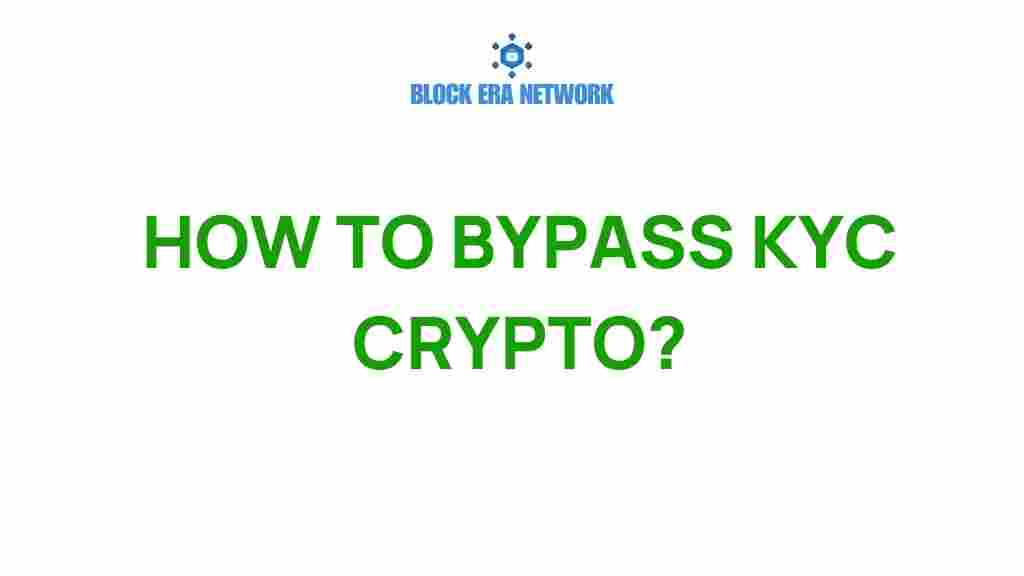Unlocking the Secrets: How to Bypass KYC in Cryptocurrency Transactions
The rise of cryptocurrency has transformed the financial landscape, offering users a decentralized and innovative way to manage digital assets. However, with this innovation comes a significant challenge: Know Your Customer (KYC) regulations. These regulations, aimed at preventing fraud and illegal activities, often require users to verify their identities, which can compromise their privacy and anonymity. If you’re seeking ways to bypass KYC in cryptocurrency transactions while still enjoying privacy and compliance, this article is for you.
Understanding KYC and Its Impact on Cryptocurrency Transactions
KYC stands for Know Your Customer, a process used by financial institutions and cryptocurrency exchanges to verify the identity of their clients. This process typically involves submitting personal information, such as:
- Name
- Address
- Date of birth
- Government-issued identification
While KYC is intended to enhance security and compliance with financial regulations, it can also detract from the core principles of cryptocurrency, namely privacy and decentralization. Many users are uncomfortable with sharing sensitive personal information, leading to a desire to bypass KYC processes.
Why Bypass KYC?
There are several reasons why individuals seek to bypass KYC in cryptocurrency transactions:
- Anonymity: Users often want to remain anonymous to protect their privacy.
- Regulatory concerns: Some users are wary of government regulations and surveillance.
- Accessibility: Certain exchanges may be unavailable in specific regions due to KYC requirements.
- User experience: The KYC process can be cumbersome and time-consuming.
Methods to Bypass KYC in Cryptocurrency Transactions
If you’re looking to maintain your privacy while engaging in cryptocurrency transactions, here are some methods to consider.
1. Use Decentralized Exchanges (DEX)
Decentralized exchanges operate without a central authority, allowing users to trade directly with one another. Since DEXs do not require KYC, they provide an excellent option for those wanting to bypass these regulations. Some popular decentralized exchanges include:
- Uniswap
- SushiSwap
- PancakeSwap
When using a DEX, ensure you have a compatible wallet, such as MetaMask or Trust Wallet, to facilitate transactions.
2. Opt for Peer-to-Peer (P2P) Trading
P2P trading platforms enable users to buy and sell cryptocurrencies directly from each other. These platforms often have minimal or no KYC requirements. Some well-known P2P platforms are:
- LocalBitcoins
- Paxful
- Binance P2P
When engaging in P2P trading, always ensure to vet your trading partner and use an escrow service to protect your transaction.
3. Utilize Privacy Coins
Privacy coins, such as Monero (XMR) and Zcash (ZEC), are designed to enhance anonymity in transactions. Unlike Bitcoin, where transactions are traceable on the blockchain, privacy coins use advanced cryptographic techniques to obfuscate transaction details:
- Monero: Offers untraceable transactions and stealth addresses.
- Zcash: Allows users to choose between transparent and shielded transactions.
By using privacy coins, you can maintain a higher level of anonymity while engaging in cryptocurrency transactions.
4. Use Bitcoin ATMs
Bitcoin ATMs allow users to buy Bitcoin and other cryptocurrencies with cash, often without requiring KYC information. To use a Bitcoin ATM:
- Locate a nearby Bitcoin ATM using online maps.
- Insert cash and follow the on-screen instructions to receive your cryptocurrency.
- Ensure to check the fees, as they can be higher than traditional exchanges.
5. Choose Exchanges with Minimal KYC
Some cryptocurrency exchanges have minimal KYC requirements, allowing users to trade with less personal information. Examples include:
- KuCoin
- BitMax
- Bybit
These exchanges may allow you to trade smaller amounts without completing full KYC verification.
6. Use Mixing Services
Mixing services, or tumblers, help obfuscate the source of your cryptocurrency by mixing your coins with others. This process makes it difficult to trace the origin of funds. However, using mixing services can be risky as they may not be legal in all jurisdictions and can be associated with illicit activities. Proceed with caution and research thoroughly.
7. Employ VPNs and Tor
Using Virtual Private Networks (VPNs) and the Tor network can enhance your online privacy when engaging in cryptocurrency transactions. A VPN encrypts your internet connection, hiding your IP address, while Tor anonymizes your browsing activity. Together, they help maintain your anonymity:
- Choose a reputable VPN service.
- Download and install the Tor browser.
- Access cryptocurrency exchanges or wallets through these tools.
Troubleshooting Common Issues
Even when trying to bypass KYC, users may encounter certain challenges. Here are some common issues and troubleshooting tips:
Problem 1: Difficulty Accessing DEX or P2P Platforms
Some users may have trouble finding liquidity or suitable trading partners on DEXs or P2P platforms. To resolve this:
- Join community forums or social media groups related to your chosen platform.
- Consider expanding the range of assets you are willing to trade.
- Ensure your internet connection is stable to avoid disconnections.
Problem 2: High Fees on Bitcoin ATMs
Bitcoin ATMs often charge high transaction fees. If you’re facing this issue:
- Compare fees across different ATMs before making a transaction.
- Consider using online exchanges or P2P platforms if fees are prohibitive.
Problem 3: Legal Concerns with Mixing Services
Using mixing services can raise legal issues depending on your jurisdiction. To mitigate this risk:
- Research the legality of mixing services in your area.
- Use reputable mixing services with positive reviews.
Conclusion
Bypassing KYC in cryptocurrency transactions is a complex issue that requires a nuanced understanding of privacy, anonymity, and compliance. While the methods outlined in this article can help you maintain your privacy, it’s essential to remain informed about the legal implications and potential risks involved. Always prioritize secure practices and consider your local regulations when engaging with cryptocurrencies.
For further reading on the implications of KYC regulations, visit this resource. If you’re looking for more tips on enhancing your cryptocurrency experience, check out our other articles here.
This article is in the category Crypto Security and created by Block Era Network Team
